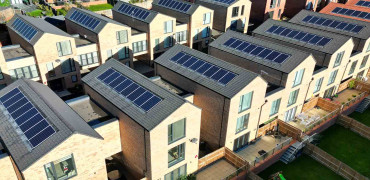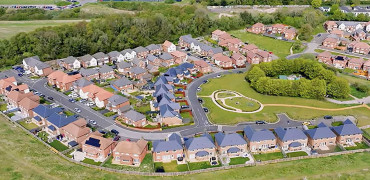On 26 November 2025, the Chancellor will deliver the Autumn Statement. For most people it will feel like another day of politics in Westminster. But I see it differently.
What happens on that day will affect every single one of us, because it will decide the future of the place we all care about most, our homes.
For decades Britain has struggled with draughty, inefficient housing. Too many of our homes leak heat, waste energy, and saddle families with high bills. Compared to our European neighbours, our housing stock is some of the least energy efficient. Families here pay more for less comfort.
That is not inevitable. It’s simply a problem we’ve inherited, and we finally have a government that can put it right. That’s why this Autumn Statement matters so much.
Labour came to power promising a decade of national renewal. They promised to make Britain a clean energy superpower, to rebuild industry, and to give families comfort and security.
At the heart of that mission must be our homes. Warm, healthy, low-carbon homes aren’t a luxury. They are national infrastructure. They cut bills. They cut carbon. And they create hundreds of thousands of good jobs across the country.
The date is set. The question is whether we will seize this once-in-a-generation opportunity to lead a Green Homes Revolution.
This isn’t radical, just common sense and the nation-building mission Labour promised
The Starting Point
This government has already taken important steps. The Warm Homes Plan, a £13.2 billion commitment to retrofit 5 million homes by 2030, is the most ambitious programme Britain has ever seen for upgrading our housing stock. It could save families hundreds of pounds a year on bills while cutting emissions. It’s exactly the kind of scale we’ve needed for years.
Labour has also promised to publish the Future Homes Standard, making sure that from 2025 every new home is built to a high level of efficiency, with no gas boilers.
It’s such a simple step, but it’s absolutely vital. It stops us building homes that are already out of date the day the keys are handed over.
I’ve said before how critical this is for hitting our Net Zero targets, and I’ll say it again now. We can’t afford to keep making tomorrow’s retrofit problems today.
And there are strong signals that the government is looking seriously at energy bill reform, shifting levies off electricity so it becomes cheaper to run a heat pump than a gas boiler. That one change could transform clean heating adoption almost overnight.
So, the foundations are in place. The Autumn Statement is the moment to turn those good intentions into a bold national mission.
The Scale of the Challenge
The task ahead is huge.
- UK homes lose heat three times faster than homes in many European countries. Our housing stock is famously old and poorly insulated, which is why British families spend winters shivering and paying through the nose.
- Heating and powering buildings creates almost a third of the UK’s emissions. 30% is the approximate share of the UK’s total CO₂ emissions that comes from heating and powering our buildings (homes are 17% alone). Without a revolution in buildings, net zero is impossible.
- 600,000 – Government’s target for annual heat pump installations by 2028. We’re currently at 60,000 per year – so a 10× increase is needed in just a few years. (Put another way, the UK sold 1 heat pump per 400 homes last year, vs 1 per 35 homes in Sweden).
- 71% – The proportion of new UK homes still being built with fossil-fuel gas boilers today . Despite upcoming standards, a vast majority of 2023/24 new builds are locking in future retrofit costs. The 2025 gas boiler ban in new homes can’t come soon enough.
- 1.5 vs 29 – Annual heat pump sales per 1,000 households in the UK versus in Sweden (1.5 in the UK, 29 in Sweden). This stark contrast shows how far behind we are on heat pump adoption, and what catching up would look like. These numbers show the scale of the challenge. But they also show the scale of the opportunity. If we fix Britain’s homes we cut bills, cut emissions, and even cut NHS costs, all at the same time.
What We Need Now
So, what should this Autumn Statement deliver to make it a true turning point?
The Great British Retrofit.
What we need now is a Great British Retrofit. Not another pilot scheme or short-term project, but a proper national mission.
Street by street, town by town, coordinated by local councils so whole communities benefit together. Millions of homes insulated, fitted with heat pumps, triple-glazed and future-proofed.
Done at scale, through mass procurement, the costs come down and the benefits go up. This is national infrastructure every bit as important as roads and railways.
And the beauty of it is so simple, every pound we spend on insulation cuts family bills and reduces our reliance on gas.
Warm Homes Stamp Duty
We’ve got to start valuing energy efficiency in the same way we value location or size.
Imagine if stamp duty actually rewarded people for buying an efficient home, or for upgrading it within a couple of years.
A proper rebate would do it. No extra cost to government, just a smart, revenue-neutral nudge.
And it would finally bake energy performance into the housing market, so efficiency becomes something people are proud to invest in.
Green Mortgages and Loans
We need a massive expansion of green finance, with zero-interest loans backed by government so every household can afford to upgrade. Let’s get the UK Infrastructure Bank and retail banks offering proper 0% loans, underwritten by government.
We know it works, Germany’s KfW scheme has already modernised millions of homes with a mix of cheap loans and grants. We should be doing the same here.
Expand the Green Home Finance programmes so every homeowner has access to affordable funding for insulation and heat pumps. No family should be priced out of making their home warmer, greener and cheaper to run.
Abolish VAT on Retrofit Materials
We need to scrap VAT on retrofit materials and services, so no one is taxed for cutting their bills.
Permanently zero-rate VAT on all retrofit materials and services, not just on insulation (already 0%) but also heat pumps, energy storage, triple-glazed windows, etc.
This simple tax change makes it cheaper to green your home. It’s a quick win to signal that upgrading is as important as building new.
(Bonus: Also remove the bizarre VAT rule penalising people adding a battery to existing solar panels, a missed open goal noted in last year’s budget)
A Gas Guzzler Levy
We need a clear plan to rebalance energy prices, so clean electricity is always cheaper than gas. Right now, households are stuck with a crazy distortion, electricity costs three to four times more per unit than gas.
That makes no sense when we want people to switch to heat pumps and clean power.
Government should set out a proper roadmap, shift legacy renewables costs off electricity bills, or put a small carbon levy on gas.
Even the Institute for Fiscal Studies says the current setup pushes people away from clean energy and makes net zero more expensive.
Fix this and suddenly heat pumps become far cheaper to run than boilers. It’s a direct incentive for families to go green.
Net-Zero Accelerators
We should go further and mandate that every new building not only meets the Future Homes Standard but also comes with solar panels and battery-ready wiring as standard.
If France can do it with their RE2020 rules, banning gas boilers in new homes and setting tough carbon limits, then Britain should be every bit as ambitious.
And let’s think beyond energy too.
Every new development should build in green space and climate-ready design, more trees and shade to adapt to climate change.
That’s how we future-proof our housing for generations to come.
Net Zero Hubs
We need local Net Zero Hubs in every council, giving households trusted advice and coordinating delivery.
Think of them as one-stop shops, helping families understand their options, connecting them with reliable installers, and making sure the work is done properly.
We’ve had versions of this before with local energy advice centres, now it’s time to bring them back at scale.
In the past, the missing link was local capacity. Build it again and we’ll not only make delivery smoother, but we’ll also create jobs in every community.
Skills for the Green Economy
And we need a National Green Skills Apprenticeship Programme, training tens of thousands of people every single year.
Alongside the capital spending, government should back colleges and employers to take on at least 20,000 new apprentices by 2030 — in retrofit, heat pumps, insulation, electrics, the lot.
With a proper wage subsidy, we can attract workers from fossil fuel trades and give young people a clear career path.
The pay-off is massive, between 135,000 and 725,000 new jobs in low-carbon industries by 2030.
But we’ll only get there if we invest in skills now. A bold programme would make sure our British and much-needed overseas workers are delivering the housing transition and stop a skills shortage from holding us back.
None of this is radical. It is common sense. And it is exactly the kind of practical, nation-building mission Labour promised.
Skills and Jobs in this Budget
This Autumn Statement can’t just be about bricks and boilers; it has to be about people’s livelihoods too.
Right now, Britain has only around 3,000 trained heat pump engineers, when we’ll need almost 30,000 within a few years. That gap won’t close by itself. It needs proper Budget commitments, funding for apprenticeships, backing for colleges, and support for employers to take people on.
The numbers tell the story. If we invest now, by 2030 Britain could see more than 700,000 new jobs in retrofit, renewables and construction.
That isn’t a distant dream, it’s a workforce we must start building with this very Budget. Without it, the Warm Homes Plan and all the other promises risk being slowed by skills shortages.
Capital spending on insulation and heat pumps is welcome, but it won’t deliver without people to do the work. This is the moment to tie the two together — investment plus skills, infrastructure plus people.
That’s how Labour can make this Budget a turning point not only for energy bills, but for jobs in every community.
Homes are about People
At the heart of all this are families.
This isn’t about kilowatts or carbon targets; it’s about everyday life. It’s about kids being able to sit at the kitchen table without freezing fingers. It’s about pensioners enjoying their evenings without choosing between heating and eating. It’s about families feeling proud of their homes, not anxious about the next bill.
That’s why the Budget matters.
Every pound for insulation, every grant for a heat pump, every solar panel supported is an investment in people’s wellbeing. It’s security, its comfort, it’s fairness.
And there’s a health dividend too. Cold, damp homes make us ill and cost the NHS billions every year.
If this Autumn Statement puts serious money behind healthier homes, it’s also putting money into a healthier nation. It’s preventative medicine delivered in bricks and mortar.
Our Next Great Rebuild
Britain has always shown its character when the challenges are biggest.
We didn’t just build homes in the Industrial Revolution; we built whole cities and powered a modern economy.
We didn’t just create the NHS, we built the fairest healthcare system in the world, free at the point of need.
We didn’t just rebuild after the war, we rebuilt communities, schools, factories and lives.
Time and again, when the moment comes, Britain chooses ambition over caution.
Now the Autumn Statement gives us the chance to write the next chapter.
With the right Budget choices, we can make Britain’s homes fit for the twenty-first century, upgrading every street, bringing bills down, and giving communities something to be proud of.
Final Word
This government now has the chance to write history. It can tinker at the edges, or it can launch the greatest home improvement programme Britain has ever seen.
It can let us drift, or it can lead a mission that cuts bills, cuts carbon and creates good jobs in every part of the country.
I’ve spent my life working with homes. I know how much they matter. They shape our health, our finances, our pride and our sense of security.
When homes are cold, damp and costly to run, people suffer. When they are warm, efficient and well-designed, lives are transformed.
More than that, warm, healthy homes are not a luxury. They are the foundation of a fair society. They are the backbone of a strong economy.
And they are the key to showing the world that Britain is serious about climate leadership.
That’s why the Autumn Statement matters. It isn’t just about lines on a balance sheet. It’s about changing and improving lives. It’s about building a fairer economy with good jobs. It’s about making Britain a world leader in green, affordable housing.
The date is set. Let’s make this the moment Labour leads a Green Homes Revolution.
George Clarke is a TV presenter, architect, writer and Ecodan Ambassador




